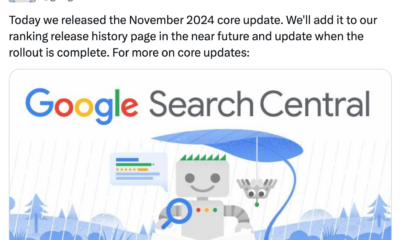SEO
Google’s John Mueller Seeks Advice On Hiring SEO Consultants

Google Search Advocate, John Mueller, has turned to Twitter seeking advice on what to consider when hiring an SEO consultant.
He posed the question on behalf of someone running an animal park, indicating the need for a local SEO consultant to enhance their online presence.
“Does anyone have recommendations in terms of people/companies & things to watch out for when picking one?” Mueller asked in his tweet, “How do you separate the serious from the less-serious folks?”
Here’s a look into the ensuing conversation, including a range of insights into what you should look for when hiring SEO professionals.
Cost Considerations In SEO Consultancy
One of the replies to Mueller’s tweet highlighted the cost-sensitive nature of SEO consultancy.
Kris Roadruck emphasized that most low-budget local SEO services, charging below $1000 per month, are “chop-shops” offering minimal service.
He claims these services follow a generic formula and warned that’s the level of quality businesses can expect unless they expand their budget.
Roadruck states:
“This is unfortunately budget-sensitive. Nearly all the folks that do low-budget local SEO (Sub $1000/mo) are chop-shops doing very little indeed and just following a generic formula performed by underpaid folks. Sadly this is the price range most local companies can afford unless they are attorneys, dentists, or some other high value service based biz.”
“This is painfully true,” reads a reply to his tweet.
Look For Experienced SEO Agencies
Isaline Muelhauser responded to Mueller’s tweet by suggesting that a local agency could be a helpful resource.
She highlights the advantages of working with an agency that operates in the same area as the business requiring local SEO services:
“Chose someone who’s experimented in local SEO and understands the local market.
E.g. for Local SEO we manage multilingualism and often low [monthly search volume].
The animal park owner should feel that their business is understood not receive a general pitch deck.”
To that end, it helps to ensure the agency you hire is familiar with the tools of the trade.
An individual who goes by the handle SEOGoddess on Twitter states:
“If the local SEO company knows what @yext or @RenderSeo is then that’s the first step in trusting they know what they’re doing. From there it’s a matter of drafting up a good strategy and knowing how to help execute on it.”
Insights From The Twitter Exchange
The Twitter thread sparked a variety of responses. However, these key topics were left unexplored:
- Specific criteria or red flags to watch out for when evaluating potential SEO consultants.
- Concrete examples or case studies demonstrating successful SEO strategies (bonus points for businesses like an animal park.
To address these gaps, let’s look at a successful SEO strategy for a local business dealing with animals.
The most relevant case study I could find is from Step 5 Creative, who performed local SEO services for Deer Grove Animal Hospital in Illinois.
This case study shows what’s involved in a comprehensive SEO approach and what you should expect from an experienced agency.
Takeaways From A Successful SEO Strategy
The first step in Step 5’s SEO campaign was a thorough onboarding process, which included the following:
- Creating meta titles and descriptions
- Conducting a URL audit
- Ensuring a mobile-friendly site
- Setting up proper page structures
- Internal navigation audit
- Implementing local business structured data.
The above steps aim to improve a site’s visibility to human visitors and search engine bots.
Step 5’s strategy also involved ensuring the business was listed in local online directories and had a complete Google Business Profile.
Keyword reassessment was another crucial step. The team monitored clickthroughs and positions for targeted keywords and adjusted their strategy accordingly.
The team conducted extensive keyword research, experimenting with different variations of keywords to see which yielded better results.
Reviewing the animal hospital’s traffic acquisition report and bounce rate helped the Step 5 Creative team understand where visitors came from and how they interacted with the site. This information allowed them to improve the user experience and encourage better traffic flow.
Lastly, the team underscores the need for continual updates for long-term success. This refers to the earlier point of working with an SEO consultant committed to staying current with best practices.
Criteria & Red Flags in SEO Consultancy
In the complex world of SEO, it’s essential to differentiate between “serious” and “less-serious” consultants.
Serious consultants are invested in understanding your business, industry, and specific needs.
In contrast, less-serious consultants might offer generic services not catering to your unique requirements.
Here are additional criteria to consider and red flags to watch for when hiring an SEO professional:
- Customized Strategy: A serious SEO consultant will take the time to understand your business, its goals, and its challenges and design a tailored SEO strategy accordingly.
- A consultant offering a one-size-fits-all solution without understanding your needs could be a red flag.
- Transparency: Reputable SEO consultants will be open about their methods and strategies and able to explain them in terms you understand.
- Beware of consultants who promise immediate results or use jargon to confuse you.
- Track Record: Look for consultants with a proven track record of success. They should be able to provide case studies or references from previous clients.
- Consider this a red flag if a consultant is unwilling or unable to provide evidence of their success.
- Continual Learning: SEO is a constantly changing field. Serious consultants will stay up-to-date with the latest SEO trends and algorithm changes.
- Be cautious of consultants who rely on outdated practices.
- Ethical Practices: A serious SEO consultant adheres to ethical SEO practices, often called “White Hat SEO.”
- Avoid consultants who suggest or employ unethical practices, known as “Black Hat SEO,” such as keyword stuffing or hidden text.
In Summary
The Twitter conversation initiated by Google’s John Mueller provided valuable insights into what to consider when choosing an SEO professional.
Cost shouldn’t be the sole factor, as low-budget services often deliver minimal results.
Instead, prioritize experienced SEO agencies that understand the local market and have a track record of success.
Look for consultants knowledgeable about industry tools who can develop a customized strategy tailored to your business’s needs.
Other essential factors include transparency, a proven track record, continual learning, and adherence to ethical practices.
By following these guidelines, you can make an informed decision when hiring an SEO consultant that will help your business thrive in the digital landscape.
Featured image generated by the author using Midjourney.












